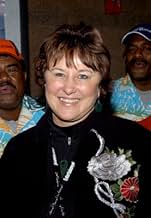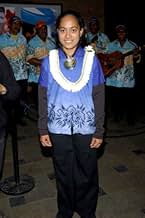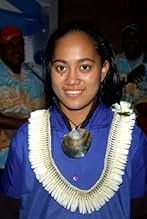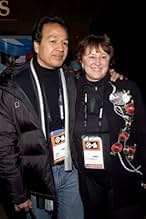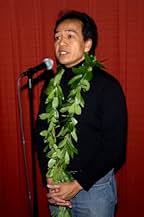Agrega una trama en tu idiomaA coming of age story about a young woman, Viki, attempting to escape the stifling conformity of island culture. Inspired by the myth of the Warrior Woman, Viki recovers from the death of he... Leer todoA coming of age story about a young woman, Viki, attempting to escape the stifling conformity of island culture. Inspired by the myth of the Warrior Woman, Viki recovers from the death of her father and fights for justice and freedom.A coming of age story about a young woman, Viki, attempting to escape the stifling conformity of island culture. Inspired by the myth of the Warrior Woman, Viki recovers from the death of her father and fights for justice and freedom.
- Dirección
- Guionista
- Elenco
- Premios
- 1 premio ganado y 1 nominación en total
James Davenport
- Judge Clarke
- (as James M Davenport)
- Dirección
- Guionista
- Todo el elenco y el equipo
- Producción, taquilla y más en IMDbPro
Opiniones destacadas
Saw the film at the first theatrical release in Honolulu. I was surprised at how many people were in the audience given the type of film (inde film with subtitles). The film quality at times wasn't great (grainey and exalted). There was a Q&A after the film and there were several other Polynesians in the audience that really identified with the film, growing up on a small island and looking forward to bigger adventures in life.
There was one scene involving pigs that an audience member asked about and the thoughts of the director and how it came across weren't really in sync. His description of what he was trying to say via the visuals wasn't presented in such a way that I received that same message. The film does show some very beautiful views and vistas of the island and the people. It also gives some insight into the day to day life of people who live on a small island.
I enjoyed the film overall to get a look into other areas of the world and to see the cultures of those people. In the case of this movie, I think that mission was accomplished successfully.
There was one scene involving pigs that an audience member asked about and the thoughts of the director and how it came across weren't really in sync. His description of what he was trying to say via the visuals wasn't presented in such a way that I received that same message. The film does show some very beautiful views and vistas of the island and the people. It also gives some insight into the day to day life of people who live on a small island.
I enjoyed the film overall to get a look into other areas of the world and to see the cultures of those people. In the case of this movie, I think that mission was accomplished successfully.
As a Polynesian of Hawai'i, I am of course very supportive of Polynesian actors, actresses, and directors gaining exposure and fame in the international arena of theater and movies.
It is way overdue for the people of our region to be recognized for our deeper sense of beauty, which lies more in the depth of our eyes than the swaying of our hips.
As this film portrays, we have traditional cultural values and customs in our heritage which lie at the core of our beauty, which has managed to survive in some of us, and yet not others.
After nearly two centuries of colonization and absorption by foreign cultures, it is amazing that the spirit in our eyes and in the land still shines!
To produce this film was no small task due to logistics and funding, but it also was very brave to take the risk of being possibly scorned by the director's ancestral villagers.
In real life as well as seen in this film, the bitterness in the eyes of those who scorn "the old ways" of religion; are also likely to scorn "the new ways" of taking risks and initiatives.
I salute this film for bringing our focus to this unspoken struggle and the beauty of the main character who symbolizes a crucial cultural and spiritual link to the past and to the future, except I want MORE. I want more of the director's talent; and more of the main character's spiritual strength; and more exposure to the depth of our culture.
Are there investors interested in films that show natives thriving beyond surviving?
Imagine if she would go on to a university in New Zealand and become a professor of environmental law, who teaches the values of traditional knowledge and provides the means for livelihoods on Rotuma based on traditional cultural practices of caring for the land?
What if she were to also develop artistic talents and sculpt a large statue of "Warrior Mother" and place it in the middle of the village (by the Christian church ) and dedicate it with proper traditional spiritual ceremonies and have all the villagers join in chanting without fear of hell and damnation...now wouldn't that move us all onto another level of greatness?
We all deserve MORE.
Encore! Encore! Hana Hou! We want MORE.
It is way overdue for the people of our region to be recognized for our deeper sense of beauty, which lies more in the depth of our eyes than the swaying of our hips.
As this film portrays, we have traditional cultural values and customs in our heritage which lie at the core of our beauty, which has managed to survive in some of us, and yet not others.
After nearly two centuries of colonization and absorption by foreign cultures, it is amazing that the spirit in our eyes and in the land still shines!
To produce this film was no small task due to logistics and funding, but it also was very brave to take the risk of being possibly scorned by the director's ancestral villagers.
In real life as well as seen in this film, the bitterness in the eyes of those who scorn "the old ways" of religion; are also likely to scorn "the new ways" of taking risks and initiatives.
I salute this film for bringing our focus to this unspoken struggle and the beauty of the main character who symbolizes a crucial cultural and spiritual link to the past and to the future, except I want MORE. I want more of the director's talent; and more of the main character's spiritual strength; and more exposure to the depth of our culture.
Are there investors interested in films that show natives thriving beyond surviving?
Imagine if she would go on to a university in New Zealand and become a professor of environmental law, who teaches the values of traditional knowledge and provides the means for livelihoods on Rotuma based on traditional cultural practices of caring for the land?
What if she were to also develop artistic talents and sculpt a large statue of "Warrior Mother" and place it in the middle of the village (by the Christian church ) and dedicate it with proper traditional spiritual ceremonies and have all the villagers join in chanting without fear of hell and damnation...now wouldn't that move us all onto another level of greatness?
We all deserve MORE.
Encore! Encore! Hana Hou! We want MORE.
This film's title ("The Land Has Eyes" in English) is taken from a Rotuman saying, "The land has eyes and teeth and knows the truth." It reflects the conviction of the native population of Rotuma a tiny island 300 miles north of Fiji - that in time wrongs will be righted, and bad deeds will be avenged. Meanwhile, one must be patient and live in harmony with others, even one's enemies. A highly pragmatic philosophy when everybody is stuck on a tiny patch of land and they're all related to one another to boot.
Obtaining justice is an important subtext of this coming-of-age film, the first feature made by a Fijian native. The central character is a high school girl, Viki (Sapeta Sokagaito Taito, a 17 year old native Rotuman), who is smart and ambitious. Viki feels disrespected by her mother, who prefers to teach homemaking skills to Viki's older sister, not someone with the intellectual skills or backbone we see in Viki.
But there is a certain wisdom in the mother's stance. Viki gravitates toward her father, aiding him in more physically demanding tasks like coconut harvesting. More importantly, by staying close to him she also comes to identify with her father's faithful adherence to traditional folkways and beliefs, as well as his frustration when he is unjustly convicted of a crime of theft that he did not commit.
Unlike the young heroine in the Maori film, "Whale Rider," with which this film has much in common, Viki is not constrained by a misogynistic folk tradition that prohibits women from rising to strong community leadership roles. Indeed, the film opens with a reenactment of a Rotuman creation myth that shows the origin of the first ruler, Warrior Woman (played by Rena Owen, a Maori actress who starred in "Once Were Warriors").
Still, Viki and her family must contend with the crooked Poto, the man who framed Viki's father and tries to manipulate local authorities to choose his nephew over Viki to receive a scholarship for further schooling in Fiji. Fulfilling the promise of the film's title, things do work out at the end, though there is need for some of Warrior Woman's magic to finally make things right.
The screenplay, written by the director, is quite good, but the photography and editing are undistinguished, failing to evince much beauty in the tropical surroundings. The acting, apart from Ms. Taito's more than adequate turn, is also not first rate. The film is important, nonetheless, because it is a Fijian first and also because it provides a fascinating window into a culture most Westerners don't know. (In Rotuman & English) My rating: 6.5/10 (low B). (Seen on 04/16/05). If you'd like to read more of my reviews, send me a message for directions to my websites.
Obtaining justice is an important subtext of this coming-of-age film, the first feature made by a Fijian native. The central character is a high school girl, Viki (Sapeta Sokagaito Taito, a 17 year old native Rotuman), who is smart and ambitious. Viki feels disrespected by her mother, who prefers to teach homemaking skills to Viki's older sister, not someone with the intellectual skills or backbone we see in Viki.
But there is a certain wisdom in the mother's stance. Viki gravitates toward her father, aiding him in more physically demanding tasks like coconut harvesting. More importantly, by staying close to him she also comes to identify with her father's faithful adherence to traditional folkways and beliefs, as well as his frustration when he is unjustly convicted of a crime of theft that he did not commit.
Unlike the young heroine in the Maori film, "Whale Rider," with which this film has much in common, Viki is not constrained by a misogynistic folk tradition that prohibits women from rising to strong community leadership roles. Indeed, the film opens with a reenactment of a Rotuman creation myth that shows the origin of the first ruler, Warrior Woman (played by Rena Owen, a Maori actress who starred in "Once Were Warriors").
Still, Viki and her family must contend with the crooked Poto, the man who framed Viki's father and tries to manipulate local authorities to choose his nephew over Viki to receive a scholarship for further schooling in Fiji. Fulfilling the promise of the film's title, things do work out at the end, though there is need for some of Warrior Woman's magic to finally make things right.
The screenplay, written by the director, is quite good, but the photography and editing are undistinguished, failing to evince much beauty in the tropical surroundings. The acting, apart from Ms. Taito's more than adequate turn, is also not first rate. The film is important, nonetheless, because it is a Fijian first and also because it provides a fascinating window into a culture most Westerners don't know. (In Rotuman & English) My rating: 6.5/10 (low B). (Seen on 04/16/05). If you'd like to read more of my reviews, send me a message for directions to my websites.
10yrussell
This was filmed on an island called Rotuman, a remote part of Fiji that has its own unique culture. It is about a teenage girl who lives simultaneously in two cultures.. the ancient culture of their island and the new culture of the British. It takes places in the late 60s, and it shows her struggle to clear her father's name (he is wrongly accused of theft) and also her efforts to get into university (in the Fijian capital city, Suva), and leave the island. Most of the actors were locals. The director wanted to show his homeland in a way that represented the true life of the people... instead of stereotypes. I read that it was a real struggle to get the film made, and they mostly used local non-actors. So, you should be forgiving of the film's eccentricities. However, it is a surprisingly polished film (they had a professional production crew), with a compelling storyline and sympathetic characters. I really enjoyed this!
A fairly solid movie.
I got the required amount out of 'The Land Has Eyes'. Sapeta Taito leads a decent cast nicely, portraying a story that holds suitable intrigue and drama - it gets hearty at one particularly moment too. Of course it isn't a perfect movie, the pacing for one could've been slightly improved, but for what it is I had a pleasant enough time with it.
Cool seeing the visuals of Rotuma, a dependency of Fiji, on the silver screen. Hopefully there'll be more in the future.
////// A 2004 Rotuman film written and directed by Vilsoni Hereniko. "first ever feature film from Rotuma".
I got the required amount out of 'The Land Has Eyes'. Sapeta Taito leads a decent cast nicely, portraying a story that holds suitable intrigue and drama - it gets hearty at one particularly moment too. Of course it isn't a perfect movie, the pacing for one could've been slightly improved, but for what it is I had a pleasant enough time with it.
Cool seeing the visuals of Rotuma, a dependency of Fiji, on the silver screen. Hopefully there'll be more in the future.
////// A 2004 Rotuman film written and directed by Vilsoni Hereniko. "first ever feature film from Rotuma".
¿Sabías que…?
- TriviaFiji's official submission to the 2006 Academy Awards.
Selecciones populares
Inicia sesión para calificar y agrega a la lista de videos para obtener recomendaciones personalizadas
Detalles
- Fecha de lanzamiento
- Países de origen
- Sitios oficiales
- Idiomas
- También se conoce como
- The Land Has Eyes
- Locaciones de filmación
- Rotuma, Fiji(location: Rotuma Island)
- Productora
- Ver más créditos de la compañía en IMDbPro
- Tiempo de ejecución1 hora 27 minutos
- Color
Contribuir a esta página
Sugiere una edición o agrega el contenido que falta

Principales brechas de datos
By what name was Pear ta ma 'on maf (2004) officially released in Canada in English?
Responda

